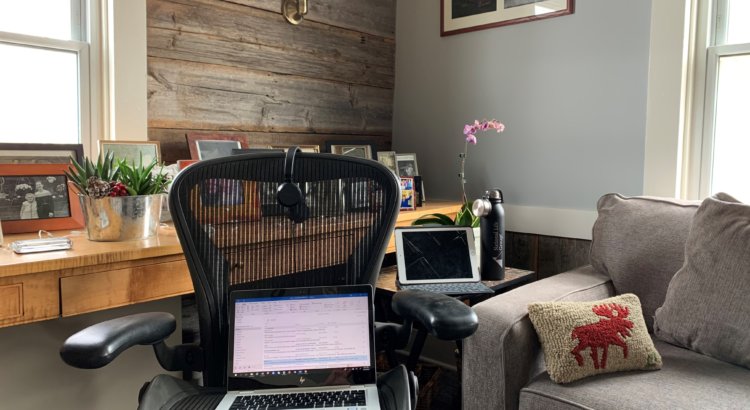
After nearly 20 years of living and working in Manhattan, 9/11 happened. It was jolting and jarring and had a big impact on my life – both personally and professionally. The current emotional energy of COVID-19 brings me back to that time. While the events are completely different, the emotions are strikingly similar: fear, uncertainty, love, compassion, helplessness and urgency.
One of the biggest changes that followed for me was a decision to leave my marketing business on Fifth Avenue and head North to the Green Mountains. The idea was to head back to the state where I was born, leave the loss and tragedy behind, and reboot my life and bring it all full circle in an idyllic way. So, I went from working in the middle of Manhattan to working in the woods – literally running my consulting business from a log cabin in Southern Vermont. I learned a lot about myself – specifically how to be productive and happy in a home office and how to take care of myself after a big life change.
Here are my five most important lessons about working from home:
- Embrace technology. Think of your home office as your mini-headquarters. You need to be using video conferencing tools like Skype or Zoom so you can still connect face to face and have meaningful and productive meetings. Also, your productivity can get a boost with team messaging platforms like Microsoft teams and Slack, as well as shared websites where people can collaborate in real-time like Google Drive or SharePoint from Microsoft. Don’t forget the low-tech creature comforts like a good headset or anergonomic office chair.
- Establish routines. Forget the stereotype of the bunny slippers. Instead, think about the routines that set you up for success in your daily life. Is it that first cup of coffee as you look over your day and prioritize what needs to get done? Is it taking a break for a walk, stretching or meditation that keeps you at peak performance? Are there routines from your old daily commutethat you can build into your work from home day – that favorite podcast or your favorite daily news mash up.
- Create regular connections. Standing meetings take on a new meaning because the need to connect is now even greater. Before you get down to business, take time to ask people how they are doing and listen to their challenges. Some people may be fighting isolation while others are juggling family at home. Listening is the first step to creating solutions that soothe anxiety and stress. Think of virtual happy hours on a Friday afternoon or coming together for a yoga classor a spontaneous dance party where kids of all ages dance the day off.
- Resist the urge to stay plugged in 24/7. It is proven that taking breaks improves your productivity. That’s why you have to resist the urge to stay plugged in all the time. Just like kids have screen time limits, as adults we also need to pay attention to how much news and information we consume. If your stress level is rising, stepping away from the email or your phone for just five minutes can quickly change your mood and give your brain the breather it needs.
- Make time for inspiration and laughter. What inspires you? Is it a motivational podcast or a Ted Talk that changes your perspective? Or hearing stories on The Moth? Whatever inspires you and makes you laugh, this is the time to give your brain that jolt of positivity.
Take this opportunity as many of us work from home together to learn about yourself, learn more about each other and come out on the other side with a new appreciation for the many small things we take for granted.
TC113503(0320)1

